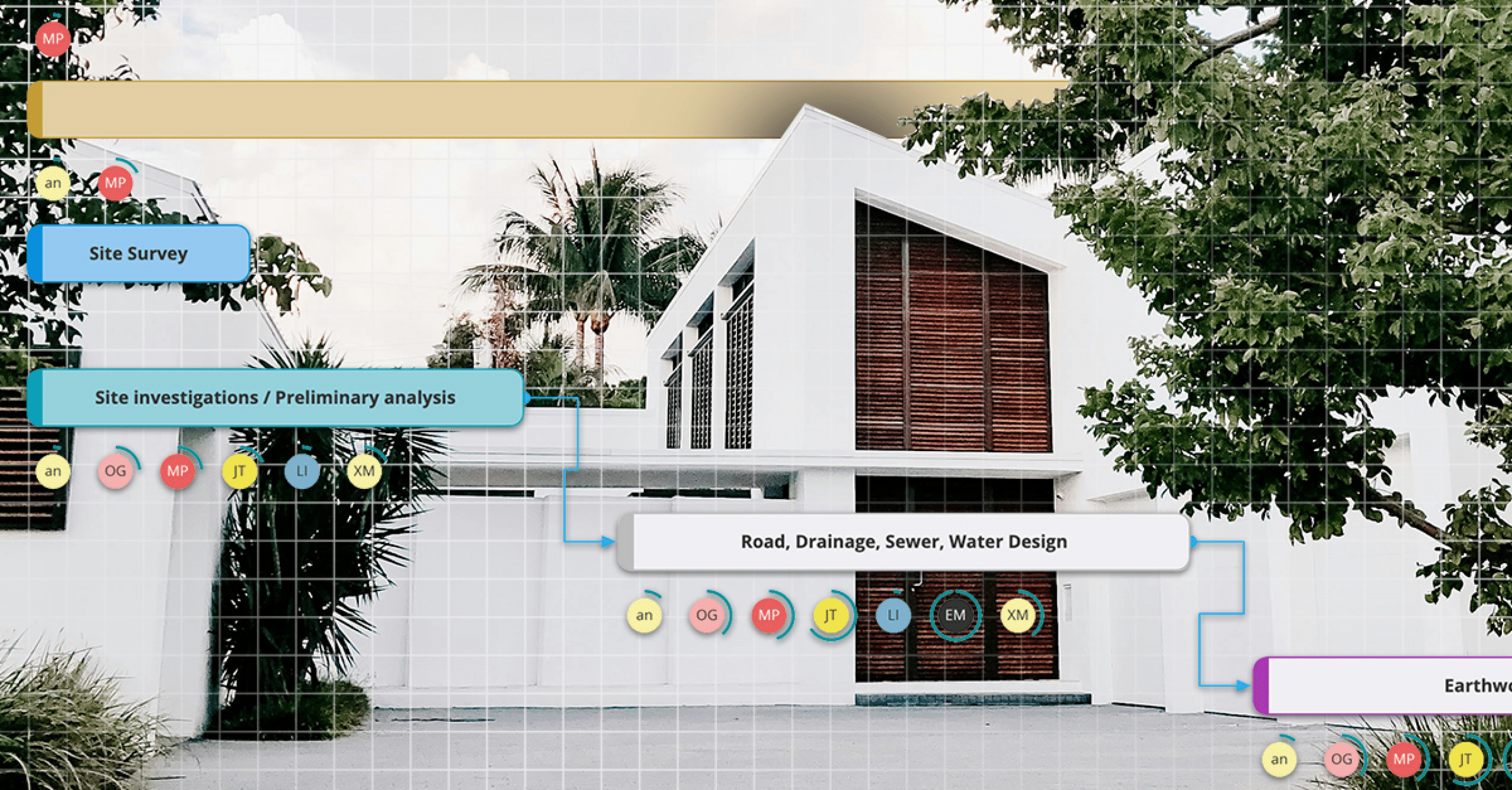In architecture, the journey from a conceptual sketch to a tangible structure is intricate and multifaceted. Each project demands a harmonious blend of creativity, technical proficiency, and strategic oversight.
Effective project management is the backbone of this process, ensuring that visionary designs are transformed into functional realities. Understanding the nuances of this discipline is paramount for architectural and engineering firms aiming to refine their project management practices.
What is Architecture Project Management?
Architecture project management encompasses the orchestration of all phases involved in the creation of a building or structure, from initial concept to final completion. It involves planning, coordinating, and overseeing resources, timelines, budgets, and stakeholders to ensure the project aligns with the client’s vision and complies with regulatory standards.
This discipline requires a balance between aesthetic aspirations and practical constraints, demanding both creative insight and meticulous organization. Project managers in this field have to navigate the complexities of design development, resource allocation, risk management, and quality assurance to deliver successful architectural projects.
The Importance of Project Management for Architecture
Architecture project management is not merely a supportive function but a critical component that influences the outcome of each endeavor. Effective project management ensures that projects are delivered on time, within budget, and to the desired quality standards. It facilitates clear communication among diverse teams, including architects, engineers, contractors, and clients, fostering collaboration and minimizing misunderstandings.
Robust project management practices help in identifying potential risks early, allowing for proactive mitigation strategies. This systematic approach enhances client satisfaction, promotes efficient resource utilization, and contributes to the overall reputation and profitability of the firm. In an industry where the margin for error is slim, adept project management is indispensable for achieving excellence and sustainability.
How Does Project Management for Architecture Differ from Other Industries?
While project management principles are universally applicable, their implementation in architecture has unique characteristics that set it apart from other sectors.
Integration of Design and Functionality
Architectural projects require a seamless blend of aesthetic design with functional utility. Project managers must ensure that creative architectural visions are grounded in practical feasibility, balancing artistic expression with structural integrity and usability.
Regulatory Compliance and Permitting
The architectural industry is heavily regulated, necessitating adherence to building codes, zoning laws, and environmental regulations. Project managers must navigate these legal frameworks diligently to avoid delays and ensure compliance throughout the project lifecycle.
Multidisciplinary Collaboration
Architectural projects involve collaboration among various disciplines, including structural engineering, mechanical systems, interior design, and landscape architecture. Coordinating these diverse teams requires exceptional communication and integration skills to align all aspects of the project.
Client-Centric Customization
Each architectural project is unique, tailored to the specific needs and preferences of the client. Project managers must adeptly manage these individualized requirements, ensuring the final outcome reflects the client’s vision while maintaining project viability.
Long Project Lifecycles
Architectural projects often span extended periods, from initial design through construction to completion. This prolonged timeline demands sustained coordination, adaptability to evolving circumstances, and continuous stakeholder engagement to maintain project momentum and coherence.
Best Practices for Effective Architecture Project Management
To excel in architectural project management, firms should adopt several best practices that enhance efficiency and project success.
Comprehensive Pre-Design Planning
Initiating projects with thorough pre-design planning sets a solid foundation. This phase involves understanding client objectives, conducting site analyses, feasibility studies, and establishing clear project scopes. Detailed planning at this stage helps in anticipating challenges and aligning expectations.
Clear Communication Channels
Establishing transparent and consistent communication among all stakeholders is vital. Regular meetings, updates, and collaborative platforms ensure everyone is informed, reducing the likelihood of misunderstandings and fostering a collaborative environment.
Detailed Work Breakdown Structures
Dividing the project into manageable tasks with specific timelines and responsibilities enhances clarity and accountability. A well-structured work breakdown facilitates better monitoring and control, allowing for timely interventions when necessary.
Risk Management Strategies
Proactively identifying potential risks and developing mitigation plans is crucial. Regular risk assessments throughout the project lifecycle enable teams to address issues before they escalate, ensuring smoother project progression.
Utilization of Advanced Project Management Tools
Leveraging specialized project management software tailored for architectural projects enhances efficiency. These tools assist in scheduling, resource allocation, budgeting, and real-time collaboration, providing a centralized platform for project oversight.
Continuous Training and Development
Investing in the ongoing education and skill development of project managers and team members ensures that the firm stays abreast of industry advancements, best practices, and emerging technologies, fostering innovation and adaptability.
Client Engagement and Feedback
Maintaining active engagement with clients throughout the project fosters trust and ensures alignment with their vision. Soliciting and incorporating client feedback at various stages allows for adjustments that enhance satisfaction and project outcomes.
Architecture Project Management Software from Total Synergy
At Total Synergy, we recognize the complexities inherent in managing architectural and engineering projects. With over twenty-five years of experience in the A&E space, our mission is to simplify how A&E practices manage projects and finances. Our project management software is designed to streamline workflows, enhance collaboration, and provide real-time financial insights, serving as the clearest path to project profitability for A&E practices.
By integrating tools for budgeting, resource allocation, and milestone tracking, our platform empowers firms to focus on delivering exceptional designs while maintaining operational efficiency. Book a demo today and discover how our innovative project management software can elevate your process.




